Refrigerant Vs Freon: Know the Differences
We may earn affiliate fees for purchases using our links (at no additional cost to you).
If you have an air conditioning system in your home or car, you may have heard the terms “refrigerant” and “freon” used interchangeably.
However, these two terms are not exactly the same, and knowing the difference between them can help you understand how your cooling system works and how to maintain it properly.
In this article, we will explain what refrigerant and freon are, how they differ, and why it matters.
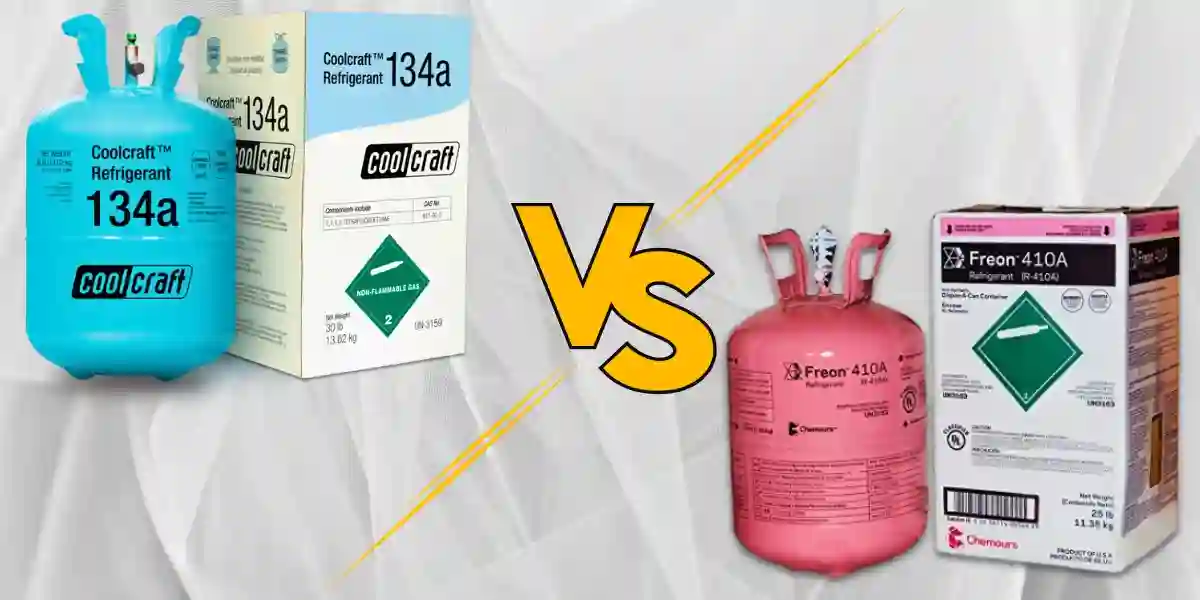
Quick Comparison
| Refrigerant | Freon |
|---|---|
| Any fluid or gas that can cool or heat. | A brand name for a refrigerant with chlorine, fluorine, and carbon. |
| Many types, such as ammonia, carbon dioxide, propane, and water. | Many types, such as R-12, R-22, R-134a, and R-410a. They are also called CFCs, HCFCs, or HFCs. |
| Different properties, such as boiling point, pressure, and environmental impact. | Similar properties, but different in structure, ODP, and GWP. |
| Numbered by their structure. For example, R-22 has two carbon, two hydrogen, and two fluorine atoms. | Numbered by their structure with R- prefix. For example, R-12 has one carbon, two chlorine, and two fluorine atoms. |
| Used in various applications, depending on suitability and compatibility. | Used in the past, but phased out or restricted due to ozone and climate damage. |
What is Refrigerant?
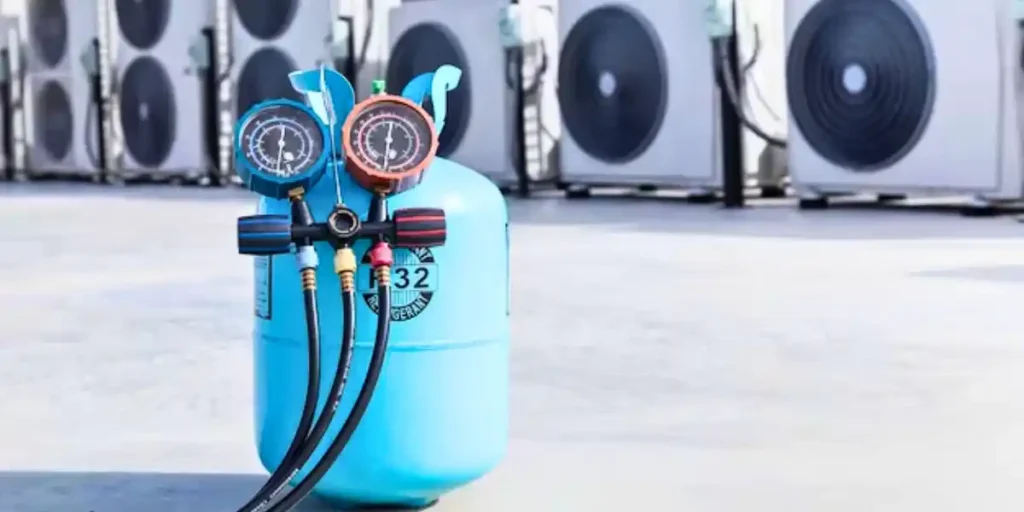
Refrigerant is a general term used to describe any substance that is used in a cooling system to transfer heat from one place to another.
Refrigerants can be liquids or gases, depending on the pressure and temperature they are exposed to.
Refrigerants work by absorbing heat from the indoor air and carrying it to the outdoor unit, where they release the heat into the environment.
This process creates a cooling effect that lowers the temperature of the indoor space.
Refrigerants can be classified into several categories, based on their chemical composition and environmental impact. Some of the most common types of refrigerants are:
Chlorofluorocarbons (CFCs):
These are synthetic refrigerants that contain chlorine, fluorine, and carbon atoms.
They have excellent cooling properties, but they also cause severe damage to the ozone layer, which protects the Earth from harmful ultraviolet radiation.
CFCs have been banned or phased out since the 1980s under the Montreal Protocol, an international agreement to protect the ozone layer.
Hydrochlorofluorocarbons (HCFCs):
These are synthetic refrigerants that contain hydrogen, chlorine, fluorine, and carbon atoms. They have similar cooling properties to CFCs, but they have less ozone-depleting potential.
However, they still contribute to global warming and are being gradually replaced by more environmentally friendly alternatives.
HCFCs are expected to be completely phased out by 2030 under the Montreal Protocol.
Hydrofluorocarbons (HFCs):
These are synthetic refrigerants that contain hydrogen, fluorine, and carbon atoms.
They have no ozone-depleting potential, but they have high global warming potential, meaning they trap heat in the atmosphere and contribute to climate change.
HFCs are widely used in modern air conditioning and refrigeration systems, but they are also subject to regulation and reduction under the Kigali Amendment, an amendment to the Montreal Protocol that aims to limit the use of HFCs by 2050.
Natural refrigerants:
These are refrigerants that occur naturally in nature or are derived from natural sources.
They include ammonia, carbon dioxide, hydrocarbons (such as propane and butane), water, and air.
Natural refrigerants have low or zero ozone-depleting potential and low or zero global warming potential, making them more environmentally friendly than synthetic refrigerants.
However, they also have some drawbacks, such as flammability, toxicity, high pressure, or low efficiency.
What is Freon?

Freon is a brand name for a type of refrigerant that was widely used in air conditioning and refrigeration systems until the 1990s.
It is a trademark registered by the Chemours Company (formerly DuPont), which uses it to produce some of its halocarbon products.
Freon is a chlorofluorocarbon (CFC) or a hydrochlorofluorocarbon (HCFC) that has been found to be harmful to the environment and is no longer produced or used in new air conditioning systems.
Freon is known for its excellent heat transfer properties and was used in a variety of applications, such as automobile air conditioning systems, refrigerators, and commercial air conditioning units.
Freon is a gas at atmospheric pressure, but when used in a cooling system, it is compressed to liquid form where it is pumped through a circuit to allow it to expand and contract each time it absorbs or releases heat.
Freon is also a common name for all brands of refrigerant, even if they are different from the original Freon products.
For example, some people may refer to R-134a or R-410a as Freon, even though they are not CFCs or HCFCs.
However, this is technically incorrect and can cause confusion when it comes to identifying the type of refrigerant used in a specific system.
Refrigerant Vs Freon
Composition:
Refrigerants are a diverse group of chemical substances used in cooling systems. They can be classified into several categories, such as hydrofluorocarbons (HFCs), hydrochlorofluorocarbons (HCFCs), and natural refrigerants like ammonia (R-717) and carbon dioxide (R-744).
Each type has unique properties that make it suitable for specific applications. R-410a and R-134a are common HFCs, while R-22 is an HCFC that has been phased out due to its ozone-depleting potential.
Freon, as a collective name for refrigerants, includes several types like R-13B1, R-503, R-12, R-22, R-502, and R-410a, among others.
It’s important to understand that not all Freon refrigerants have the same impact on the environment.
Some Freon compounds, like those containing CFCs and HCFCs, have been identified as ozone-depleting substances and are subject to strict regulation.
Environmental Impact:
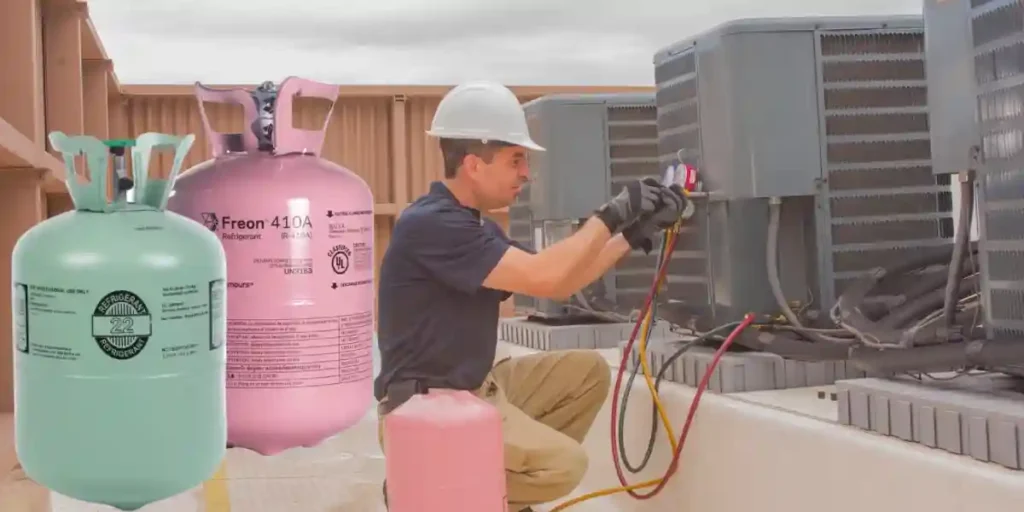
The environmental impact of refrigerants is a crucial consideration when choosing the right one for cooling systems.
CFCs and HCFCs, which were commonly used in the past, have been found to be harmful to the ozone layer and have contributed to the ozone depletion problem.
As a result, international agreements like the Montreal Protocol were established to phase out the use of these harmful substances.
HFCs, while not ozone-depleting, have a high global warming potential (GWP). They are greenhouse gases, contributing to climate change.
To address this issue, many countries are gradually phasing down the use of HFCs under the Kigali Amendment to the Montreal Protocol.
As a replacement, the industry is transitioning to more environmentally friendly refrigerants, such as hydrocarbons, ammonia, and carbon dioxide.
Freon, which includes both CFCs and HCFCs, has been largely phased out due to its harmful impact on the ozone layer and its contribution to global warming.
While it was once commonly used in various cooling applications, its production has ceased, and it’s no longer used in new AC systems. Instead, safer and more sustainable refrigerants have taken its place.
Usage:
Both refrigerants and Freon are used in various applications, such as air conditioning, refrigeration, and heat pumps.
They play a crucial role in heat transfer processes, where they absorb heat from one location and release it elsewhere to achieve cooling.
However, it’s essential to understand that Freon is no longer recommended for use in new AC systems.
Modern AC units are designed to be compatible with more environmentally friendly refrigerants like R-410a, which has a significantly lower impact on the ozone layer and climate.
Safety:
The safety of refrigerants and Freon is a significant concern, especially given their potential to impact human health and the environment.
Some refrigerants may be flammable, toxic, or corrosive, and improper handling or leakage could pose risks.
Freon, in general, is considered non-flammable and non-toxic under normal operating conditions.
However, if it leaks into enclosed spaces, it may displace oxygen and cause suffocation or asphyxiation.
Furthermore, Freon’s role in ozone depletion and climate change makes it a safety concern for the environment and future generations.
Environmental Regulations:
Refrigerants are subject to strict regulations to mitigate their impact on the environment.
As mentioned earlier, international agreements like the Montreal Protocol and the Kigali Amendment aim to control and reduce the use of harmful refrigerants with high ozone depletion potential and high global warming potential, respectively.
These regulations not only impact the production and use of certain refrigerants but also drive the adoption of more sustainable and eco-friendly alternatives in the HVAC industry.
It’s important for consumers, manufacturers, and technicians to stay informed about the latest regulations and best practices to ensure compliance and promote environmental responsibility.
Performance:
The performance of a refrigerant is influenced by various factors, including efficiency, capacity, and compatibility with equipment.
Each type of refrigerant has its strengths and weaknesses in different cooling applications.
Refrigerants like R-410a, known as Puron, have been widely adopted in modern air conditioning systems for their excellent cooling capacity and energy efficiency.
Their compatibility with newer equipment designs and focus on environmental sustainability make them attractive choices for both residential and commercial use.
On the other hand, Freon (CFCs and HCFCs) was commonly used in older AC systems and refrigeration equipment.
While it also provided effective cooling, it had a negative impact on the ozone layer. As a result, its use is now limited or phased out, and the industry has transitioned to alternative refrigerants that offer comparable performance without harming the environment.
Maintenance:
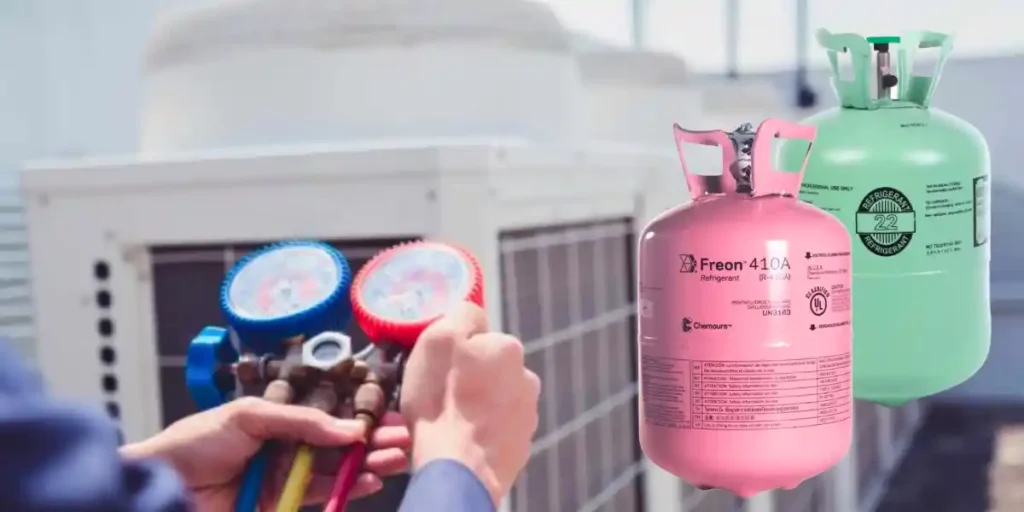
Proper maintenance of refrigerant-based systems is essential to ensure their optimal performance and safety.
Regular checks and adjustments of refrigerant levels and system components are crucial to prevent leaks and inefficiencies.
For older systems that may still use Freon, it’s important to conduct proper maintenance and servicing to extend their lifespan and reduce environmental impact.
Technicians should ensure that any leaks are repaired promptly, and the refrigerant is recycled or reclaimed responsibly.
Disposal:
Disposal of refrigerants, especially those containing CFCs and HCFCs, should be done with utmost care to prevent environmental harm.
The responsible disposal of refrigerants involves recovery, recycling, or destruction by licensed professionals.
For Freon, proper disposal is crucial due to its environmental impact and limited availability.
As the industry moves towards more sustainable refrigerants, proper recycling and reclaiming of Freon from older systems are necessary steps in minimizing its impact on the environment.
Cost:
The cost of refrigerants can vary based on various factors, including type, brand, availability, and regulations.
Some refrigerants may be more expensive than others due to market demand or supply constraints.
As for Freon, its limited availability and phased-out production make it more costly compared to newer, environmentally friendly alternatives.
While some older systems may still rely on Freon, the industry has shifted towards using more sustainable and readily available refrigerants.
Why Does It Matter?
Understanding Your Air Conditioning System
Your air conditioning system relies on a critical component known as refrigerant. This substance is responsible for absorbing heat from indoor air, cooling it down, and then releasing the heat outdoors.
The process repeats, keeping your home or office comfortably cool. Refrigerants are chemical compounds that can change states between liquid and gas at relatively low temperatures, making them ideal for this cooling cycle.
There’s a common misconception that freon and refrigerant are two distinct things, but the reality is that freon is just a specific type of refrigerant.
The term “freon” is often used to refer to any refrigerant, but technically, it specifically refers to R-22, a type of hydrochlorofluorocarbon (HCFC) refrigerant.
Due to its detrimental impact on the ozone layer, R-22 is being phased out and replaced with more environmentally friendly options.
Importance of Using the Right Refrigerant
Using the appropriate refrigerant is vital for your air conditioning system’s performance and longevity.
Each system is designed to work with a specific type of refrigerant, and using the wrong one can lead to various issues.
For instance, the wrong refrigerant can cause the system’s efficiency to drop significantly.
It may also result in increased wear and tear on the compressor, leading to more frequent breakdowns and expensive repairs.
Moreover, using the wrong refrigerant can void your system’s warranty. Manufacturers have strict guidelines regarding the refrigerants that should be used, and any deviation from these guidelines could render your warranty null and void.
This means that if your system experiences any issues, you’ll be responsible for covering the repair or replacement costs.
Environmental Impact and Compliance
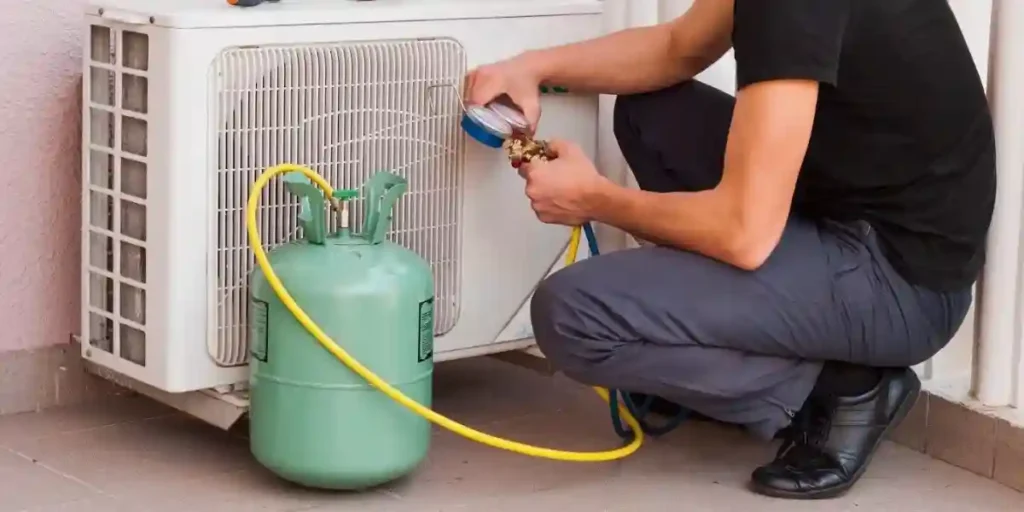
The choice of refrigerant has a significant impact on the environment. Certain types of refrigerants, such as chlorofluorocarbons (CFCs) and hydrochlorofluorocarbons (HCFCs), have been found to be major contributors to ozone depletion and global warming.
As a result, international agreements like the Montreal Protocol have been established to phase out the use of these harmful substances.
By using environmentally friendly refrigerants, such as hydrofluorocarbons (HFCs) or natural refrigerants like ammonia or carbon dioxide, you can help protect the ozone layer and mitigate climate change.
It’s essential to be aware of any regulations or restrictions regarding the use and disposal of refrigerants. Improper handling of refrigerants can have severe consequences for the environment and may lead to legal penalties.
Saving Money and Energy Efficiency
Opting for the right refrigerant can lead to significant energy and cost savings. Energy efficiency is a crucial consideration in today’s world, where energy consumption affects both the environment and your pocket.
Using a more efficient refrigerant can reduce the amount of electricity your air conditioning system consumes, resulting in lower energy bills.
Additionally, an energy-efficient system puts less strain on the electrical grid, contributing to overall energy conservation.
Moreover, proper maintenance of your air conditioning system, including regular refrigerant checks and refills, ensures it operates at its best.
A well-maintained system not only saves energy but also extends the life of your equipment, reducing the need for premature replacements or major repairs.
Conclusion
Refrigerant and freon are two terms that are often used interchangeably, but they are not exactly the same.
Refrigerant is a general term for any substance used in a cooling system to transfer heat, while freon is a specific type of refrigerant that contains chlorine and fluorine atoms and causes ozone depletion.
Freon is also a brand name for a group of halocarbon products that are no longer produced or used in new air conditioning systems.
Knowing the difference between refrigerant and freon can help you understand how your air conditioning system works and how to maintain it properly.
It can also help you protect the environment and comply with the law, as well as save money and energy.
Therefore, it is important to be aware of the type of refrigerant your system uses and how to use it correctly.